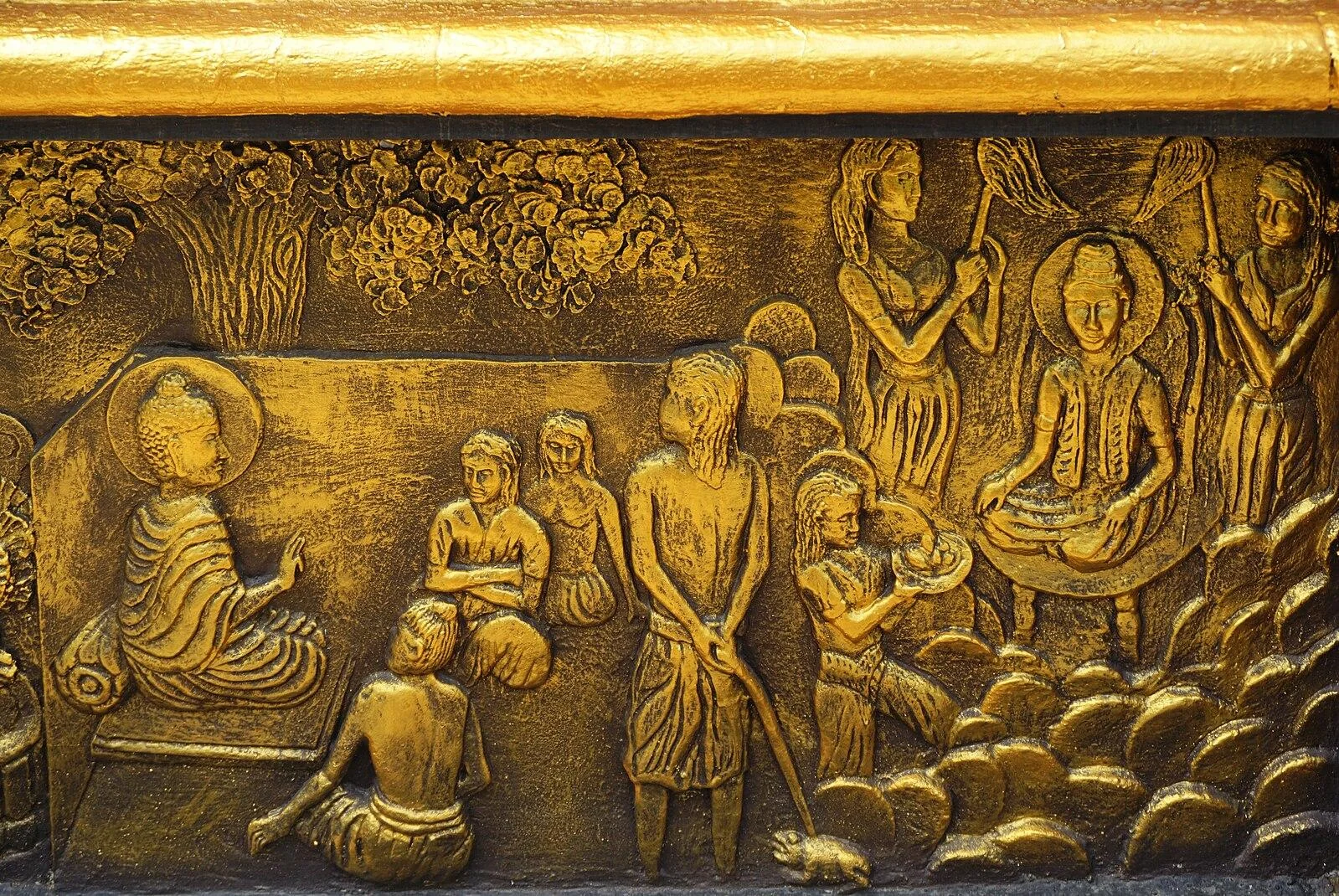A detailed analysis of the four bases of psychic ability - collectedness arising from aspiration, energy, purification of mind, and investigation. These four bases are noble, and leads one who cultivates them to become mighty, powerful, to full understanding of the five higher fetters, to liberation.
"Bhikkhus, these four bases of psychic ability, when developed and frequently practiced, are of great fruit and benefit.
"How, bhikkhus, are the four bases of psychic ability developed and frequently practiced so that they are of great fruit and great benefit? Here, bhikkhus, a bhikkhu develops the basis of psychic ability that is endowed with collectedness arising from aspiration (a goal, an interest, an objective, i.e. a wholesome desire) and accompanied by intentional effort thus: 'My aspiration will not be too slack, nor too intense, nor inwardly inhibited, nor outwardly scattered. He dwells continuously aware: 'As before, so after; as after, so before; as below, so above; as above, so below; as by day, so by night; as by night, so by day.' Thus with a mind that is clarified and unconfined, he develops a radiant mind."
A bhikkhu develops the base of psychic ability that is endowed with collectedness arising from energy and accompanied by intentional effort thus: 'My energy will not be too slack, nor too intense, nor inwardly inhibited, nor outwardly scattered.' He dwells continuously aware: 'As before, so after; as after, so before; as below, so above; as above, so below; as by day, so by night; as by night, so by day.' Thus with a mind that is clarified and unconfined, he develops a radiant mind.
A bhikkhu develops the base of psychic ability that is endowed with collectedness arising from [purification of] mind and accompanied by intentional effort thus: 'My mind will not be too slack, nor too intense, nor inwardly inhibited, nor outwardly scattered.' He dwells continuously aware: 'As before, so after; as after, so before; as below, so above; as above, so below; as by day, so by night; as by night, so by day.' Thus with a mind that is clarified and unconfined, he develops a radiant mind.
A bhikkhu develops the base of psychic ability that is endowed with collectedness arising from investigation (consideration, reflection, and examination) accompanied by intentional effort thus: 'My investigation will not be too slack, nor too intense, nor inwardly inhibited, nor outwardly scattered.' He dwells dwells continuously aware: 'As before, so after; as after, so before; as below, so above; as above, so below; as by day, so by night; as by night, so by day.' Thus with a mind that is clarified and unconfined, he develops a radiant mind.
Analysis of Aspiration
Bhikkhus, what is an aspiration that is too slack? Bhikkhus, aspiration that is accompanied by laziness and associated with laziness — this is called aspiration that is too slack.
Bhikkhus, what is an aspiration that is too intense? Bhikkhus, aspiration that is accompanied by restlessness and associated with restlessness — this is called aspiration that is too intense.
Bhikkhus, what is an aspiration that is inwardly inhibited? Bhikkhus, aspiration that is accompanied by dullness and drowsiness and associated with dullness and drowsiness — this is called aspiration that is inwardly inhibited.
Bhikkhus, what is an aspiration that is outwardly scattered? Bhikkhus, aspiration that is outwardly scattered due to engagement with the five cords of sensual pleasure — this is called aspiration that is outwardly scattered.
And how, bhikkhus, does a bhikkhu dwell continuously aware: 'As before, so after; as after, so before'? Here, bhikkhus, a bhikkhu's mindfulness of before and after is well grasped, well attended to, well sustained, and well penetrated by wisdom. Thus, bhikkhus, a bhikkhu dwells contemplating 'As before, so after; as after, so before.'
Bhikkhus, how does a bhikkhu dwell contemplating 'As below, so above; as above, so below'? Here, bhikkhus, a bhikkhu contemplates this very body from the soles of the feet upward and from the crown of the head downward, bounded by skin and full of various kinds of impurities: 'In this body there are hairs, body hairs, nails, teeth, skin, flesh, sinews, bones, bone marrow, kidneys, heart, liver, diaphragm, spleen, lungs, intestines, mesentery, stomach, feces, bile, phlegm, pus, blood, sweat, fat, tears, grease, saliva, snot, oil of the joints, and urine.' Thus, bhikkhus, a bhikkhu dwells contemplating 'As below, so above; as above, so below.'
Bhikkhus, how does a bhikkhu dwell contemplating 'As by day, so by night; as by night, so by day'? Here, bhikkhus, a bhikkhu develops the base of psychic ability that is endowed with collectedness arising from aspiration, accompanied by an intention of continuous effort by day, and also by night, thus: 'My aspiration will not be too slack, nor too intense, nor inwardly inhibited, nor outwardly scattered.' He dwells contemplating 'As before, so after; as after, so before; as below, so above; as above, so below; as by day, so by night; as by night, so by day.' Thus, bhikkhus, a bhikkhu dwells contemplating 'As by day, so by night; as by night, so by day.'
And how, bhikkhus, does a bhikkhu develop a mind that is clarified, unconfined and radiant? Here, bhikkhus, a bhikkhu's perception of brightness is well grasped, and his perception of day is well established. Thus, bhikkhus, a bhikkhu develops a mind that is clarified, unconfined, and radiant."
Analysis of Energy
And what, bhikkhus, is energy that is too slack? Bhikkhus, energy that is accompanied by laziness and associated with laziness — this is called energy that is too slack.
And what, bhikkhus, is energy that is too intense? Bhikkhus, energy that is accompanied by restlessness and associated with restlessness — this is called energy that is too intense.
And what, bhikkhus, is energy that is inwardly inhibited? Bhikkhus, energy that is accompanied by dullness and drowsiness and associated with dullness and drowsiness — this is called energy that is inwardly inhibited.
And what, bhikkhus, is energy that is outwardly scattered? Bhikkhus, energy that is outwardly scattered due to engagement with the five cords of sensual pleasure — this is called energy that is outwardly scattered.
And how, bhikkhus, does a bhikkhu dwell continuously aware: 'As before, so after; as after, so before?' Here, bhikkhus, a bhikkhu's mindfulness of before and after is well grasped, well attended to, well sustained, and well penetrated by wisdom. Thus, bhikkhus, a bhikkhu dwells contemplating 'As before, so after; as after, so before.'
And how, bhikkhus, does a bhikkhu dwell contemplating 'As below, so above; as above, so below?' Here, bhikkhus, a bhikkhu contemplates this very body from the soles of the feet upward and from the crown of the head downward, bounded by skin and full of various kinds of impurities: 'In this body there are hairs, body hairs, nails, teeth, skin, flesh, sinews, bones, bone marrow, kidneys, heart, liver, diaphragm, spleen, lungs, intestines, mesentery, stomach, feces, bile, phlegm, pus, blood, sweat, fat, tears, grease, saliva, snot, oil of the joints, and urine.' Thus, bhikkhus, a bhikkhu dwells contemplating 'As below, so above; as above, so below.'
And how, bhikkhus, does a bhikkhu dwell contemplating 'As by day, so by night; as by night, so by day?' Here, bhikkhus, a bhikkhu develops the base of psychic ability that is endowed with collectedness arising from energy, accompanied by an intention of continuous effort by day, and also by night, thus: 'My energy will not be too slack, nor too intense, nor inwardly inhibited, nor outwardly scattered.' He dwells contemplating 'As before, so after; as after, so before; as below, so above; as above, so below; as by day, so by night; as by night, so by day.' Thus, bhikkhus, a bhikkhu dwells contemplating 'As by day, so by night; as by night, so by day.'
And how, bhikkhus, does a bhikkhu develop a mind that is clarified, unconfined, and radiant? Here, bhikkhus, a bhikkhu's perception of brightness is well grasped, and his perception of day is well established. Thus, bhikkhus, a bhikkhu develops a mind that is clarified, unconfined, and radiant.
Analysis of [Purification of] Mind
And what, bhikkhus, is a mind that is too slack? Bhikkhus, a mind that is accompanied by laziness and associated with laziness — this is called a mind that is too slack.
And what, bhikkhus, is a mind that is too intense? Bhikkhus, a mind that is accompanied by restlessness and associated with restlessness — this is called a mind that is too intense.
And what, bhikkhus, is a mind that is inwardly inhibited? Bhikkhus, a mind that is accompanied by dullness and drowsiness and associated with dullness and drowsiness — this is called a mind that is inwardly inhibited.
And what, bhikkhus, is a mind that is outwardly scattered? Bhikkhus, a mind that is outwardly scattered due to engagement with the five cords of sensual pleasure — this is called a mind that is outwardly scattered.
And how, bhikkhus, does a bhikkhu dwell continuously aware: 'As before, so after; as after, so before?' Here, bhikkhus, a bhikkhu's mindfulness of before and after is well grasped, well attended to, well sustained, and well penetrated by wisdom. Thus, bhikkhus, a bhikkhu dwells contemplating 'As before, so after; as after, so before.'
And how, bhikkhus, does a bhikkhu dwell contemplating 'As below, so above; as above, so below?' Here, bhikkhus, a bhikkhu contemplates this very body from the soles of the feet upward and from the crown of the head downward, bounded by skin and full of various kinds of impurities: 'In this body there are hairs, body hairs, nails, teeth, skin, flesh, sinews, bones, bone marrow, kidneys, heart, liver, diaphragm, spleen, lungs, intestines, mesentery, stomach, feces, bile, phlegm, pus, blood, sweat, fat, tears, grease, saliva, snot, oil of the joints, and urine.' Thus, bhikkhus, a bhikkhu dwells contemplating 'As below, so above; as above, so below.'
And how, bhikkhus, does a bhikkhu dwell contemplating 'As by day, so by night; as by night, so by day?' Here, bhikkhus, a bhikkhu develops the base of psychic ability that is endowed with collectedness arising from mind, accompanied by an intention of continuous effort by day, and also by night, thus: 'My mind will not be too slack, nor too intense, nor inwardly inhibited, nor outwardly scattered.' He dwells contemplating 'As before, so after; as after, so before; as below, so above; as above, so below; as by day, so by night; as by night, so by day.' Thus, bhikkhus, a bhikkhu dwells contemplating 'As by day, so by night; as by night, so by day.'
And how, bhikkhus, does a bhikkhu develop a mind that is clarified, unconfined, and radiant? Here, bhikkhus, a bhikkhu's perception of brightness is well grasped, and his perception of day is well established. Thus, bhikkhus, a bhikkhu develops a mind that is clarified, unconfined, and radiant.
Analysis of Investigation
And what, bhikkhus, is an investigation that is too slack? Bhikkhus, an investigation that is accompanied by laziness and associated with laziness — this is called an investigation that is too slack.
And what, bhikkhus, is an investigation that is too intense? Bhikkhus, an investigation that is accompanied by restlessness and associated with restlessness — this is called an investigation that is too intense.
And what, bhikkhus, is an investigation that is inwardly inhibited? Bhikkhus, an investigation that is accompanied by dullness and drowsiness and associated with dullness and drowsiness — this is called an investigation that is inwardly inhibited.
And what, bhikkhus, is an investigation that is outwardly scattered? Bhikkhus, an investigation that is outwardly scattered due to engagement with the five cords of sensual pleasure — this is called an investigation that is outwardly scattered.
And how, bhikkhus, does a bhikkhu dwell continuously aware: 'As before, so after; as after, so before?' Here, bhikkhus, a bhikkhu's mindfulness of before and after is well grasped, well attended to, well sustained, and well penetrated by wisdom. Thus, bhikkhus, a bhikkhu dwells contemplating 'As before, so after; as after, so before.'
And how, bhikkhus, does a bhikkhu dwell contemplating 'As below, so above; as above, so below?' Here, bhikkhus, a bhikkhu contemplates this very body from the soles of the feet upward and from the crown of the head downward, bounded by skin and full of various kinds of impurities: 'In this body there are hairs, body hairs, nails, teeth, skin, flesh, sinews, bones, bone marrow, kidneys, heart, liver, diaphragm, spleen, lungs, intestines, mesentery, stomach, feces, bile, phlegm, pus, blood, sweat, fat, tears, grease, saliva, snot, oil of the joints, and urine.' Thus, bhikkhus, a bhikkhu dwells contemplating 'As below, so above; as above, so below.'
And how, bhikkhus, does a bhikkhu dwell contemplating 'As by day, so by night; as by night, so by day?' Here, bhikkhus, a bhikkhu develops the base of psychic ability that is endowed with collectedness arising from investigation, accompanied by an intention of continuous effort by day, and also by night, thus: 'My investigation will not be too slack, nor too intense, nor inwardly inhibited, nor outwardly scattered.' He dwells contemplating 'As before, so after; as after, so before; as below, so above; as above, so below; as by day, so by night; as by night, so by day.' Thus, bhikkhus, a bhikkhu dwells contemplating 'As by day, so by night; as by night, so by day.'
And how, bhikkhus, does a bhikkhu develop a mind that is clarified, unconfined, and radiant? Here, bhikkhus, a bhikkhu's perception of brightness is well grasped, and his perception of day is well established. Thus, bhikkhus, a bhikkhu develops a mind that is clarified, unconfined, and radiant.
Thus developed and frequently practiced, bhikkhus, the four bases of psychic ability are of great fruit and great benefit.
Thus, bhikkhus, a bhikkhu who has developed and frequently practiced the four bases of psychic ability experiences various kinds of psychic abilities: being one, he becomes many; being many, he becomes one; he appears and disappears; he passes through walls, enclosures, and mountains as though through space; he dives in and out of the earth as though it were water; he walks on water without sinking as though on solid ground; he flies through the air cross-legged like a bird with wings; he touches and strokes the sun and moon, so mighty and powerful; and he controls his body as far as the Brahmā world. Thus, bhikkhus, a bhikkhu who has developed and frequently practiced the four bases of psychic ability, through the wearing away of the taints, attains and dwells in the taintless release of mind and release by wisdom, having realized it with direct knowledge in this very life."
This is a fine-tuning instruction that one can use to refine their practice of the eightfold path. One can also investigate and to see whether success in any domain - spiritual or a worldly one, at the highest levels, comes through frequently practicing in the four bases of psychic abilities. If one has a view on manifestation, or on the power of desire, one can further their understanding by full understanding all the four bases needed.











This is an interesting frame, and spot about the value of mindfulness and daily practice to see these more clearly. I would also consider the aspect of the neither-painful-nor-pleasant feelings, which per the Buddha are associated with the abiding of the fourth jhāna and which one cannot experience and thus have an opportunity to gain wisdom about until the mind keeps cycling through pain resistance and pleasure seeking behavior